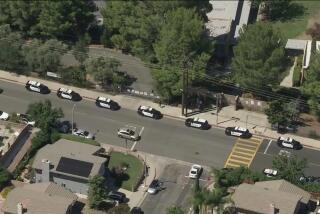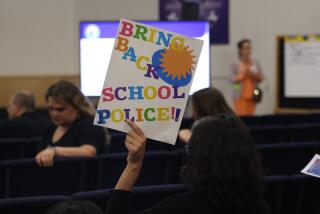A Shoulder for Students to Lean On : Schools: Crisis counselors offer comfort to youths when tragedy strikes. Sometimes they also need to console each other.
Rochelle Lavender almost broke down and cried. But that would have to wait.
Before she could shed tears of her own, there were others to dry.
Just days earlier, Lavender, Reseda High Schoolâs staff psychologist, had visited Maclay Junior High School in Pacoima, where she had counseled students grieving for a 12-year-old classmate gunned down by gang members. Now she was back at her campus, comforting confused and frightened students who saw a 17-year-old boy fatally shot in a school hallway.
âThe intervals between these crises are too short,â she said during a break. âIt depletes you.â
Lavender is a member of a small and increasingly busy group of school psychologists, counselors, nurses and administrators who have developed an emotionally exhausting specialty: counseling students when tragedy strikes. They are practitioners of psychological first aid, typically having brief and intense encounters with students they know they may never see again.
The work is always taxing, they say, but with the recent wave of teen-age killings--two on school campuses--they struggled to be a rock for the students, even when they felt that they were going to crack. And through their work, indeed through their pain, they have forged a camaraderie that allows them to keep going from school to school, student to student.
âWeâre the front line,â said Sharon Ghaleb, a nurse at Cleveland High School. âYou can take everything you learned in a book and throw it out the window in these situations. You have to be ready for anything.â
That was the case at Ghalebâs school in Reseda last week, where she and a group of counselors stood on the fringes of the gym and looked on as about 200 teen-agers gathered to mourn Rocio Delgado, a 16-year-old hit by a stray bullet in a gang shooting.
When the candlelight ceremony ended, the counselors nodded knowingly at each other and moved into the crowd. They milled among the sometimes numb and often angry students--checking each face and asking, often in Spanish, if anyone needed a friend to listen. One girl started to talk to a counselor and then broke down, hugging the counselor and burying her face in the womanâs shoulder.
Eventually, the students filtered out, and the counselors stopped for a breath.
â This is crisis counseling,â said Ivna Gusmao, a counselor for English as a second language and high-risk youths at Cleveland.
âThis is when you give everything youâve got,â said Sharon Mastor, the school psychologist.
Each campus in the Los Angeles Unified School District has its own crisis team, composed of psychologists, administrators, nurses and other staff members. The team forms battle plans at a momentâs notice to provide an outlet for the anger, grief and rumors that run rampant among students after shootings, stabbings, suicides or fatal accidents.
In addition, there are about 40 psychologists, such as Lavender, who are sometimes deployed to other schools in a crisis. And with each visit, students ask them questions that have no answers: âWhy did she have to die?â âHow can we stop the killing?â âWill I be next?â
When word of a tragedy spreads, the crisis counselors run a sort of triage, identifying disturbed students as fast as possible. They go from class to class, pulling out witnesses, friends of the victim or anyone who seems emotionally troubled.
Some counselors meet one on one with students, others with groups of 40 or 50. The meetings can last for hours or for 20 minutes. Some counselors stay a few days, others just a few hours.
âWhen you come in, you donât know the students and you canât spend too much time with any one child,â said Suzanne Silverstein, a therapist with Cedars-Sinai Medical Centerâs Psychological Trauma Center who visited Fairfax and Reseda high schools after campus shootings. âYou listen as much as you can in a group session, and you try to get them to vent their feelings.â
Because the school psychologists are not psychotherapists, they do not have the training to provide long-range counseling, said Loeb Aronin, head of the districtâs psychological services unit. They can, however, respond quickly to patch up emotional emergencies.
Lavender said that within 45 minutes of the shooting at Reseda High, counselors had gathered their first group of students--friends of the victim and youths who were shaking because they had seen 17-year-old Michael Shean Ensley killed.
Some students experienced the âwhat ifâ syndrome, wondering what would have happened if the bullet had missed Ensley and struck them. Some wondered why they could not feel safe at school. Lavender listened as they cried, some hysterically.
It is not easy to stay calm as others collapse about you. Last Monday when Gusmao arrived at Cleveland High and scanned the school bulletin leisurely, her eyes stopped at the notice of Delgadoâs shooting.
âI recognized the name and my eyes welled up immediately,â she said. âI wanted to fall apart and say: âThe hell with all of this.â â
As the news sank in, she noticed a teacher standing by her, stunned and motionless.
âShe was my student,â the teacher sobbed.
Gusmao wondered: âIf a teacher is acting this way, what are the students going through?â She swallowed her tears, comforted the teacher and pulled herself together. Within an hour, students flooded into a counseling room.
Other counselors told similar stories. âYou have to be there to be a shoulder for kids to cry on,â Ghaleb said. âBut who do we cry on?â
Each other, crisis workers said.
In a process called debriefing, counselors ask each other about the dayâs events, give a pat on the back and provide encouragement. âWe kind of do that to one another as a way to survive,â Gusmao said.
Lavender said that after Ensley was shot, her phone rang constantly with calls from other counselors. âThat support is really what enables us to pass on concern to the students,â she said.
Laurie Johnson, a school nurse at Reseda, said other nurses and psychologists called her. A few sent flowers. âI talked to every high school nurse in the Valley,â Johnson said.
Psychologists, nurses and others often flee the emotional battle lines to their offices or their homes. âSome days you just relish paperwork,â Gusmao said. âYou want to close the door and not see a human body.â
Occasionally, Gusmao comes home exhausted and finds escape by watching âa stupid show on television. Sometimes I come home and try to get to sleep and have a good cry in the dark.â
Lavender said leaving the work at school behind is impossible. âWhen itâs your school, and you work with these kids every day, and you see them hurting . . . â she drifted off, and tried to keep the tears from falling. But they just came.
âThis is so embarrassing,â she said apologetically.
On cue, the other counselors moved to her side. One put her hand on her shoulder and the other held her hand. It was OK to cry.
More to Read
Sign up for Essential California
The most important California stories and recommendations in your inbox every morning.
You may occasionally receive promotional content from the Los Angeles Times.










